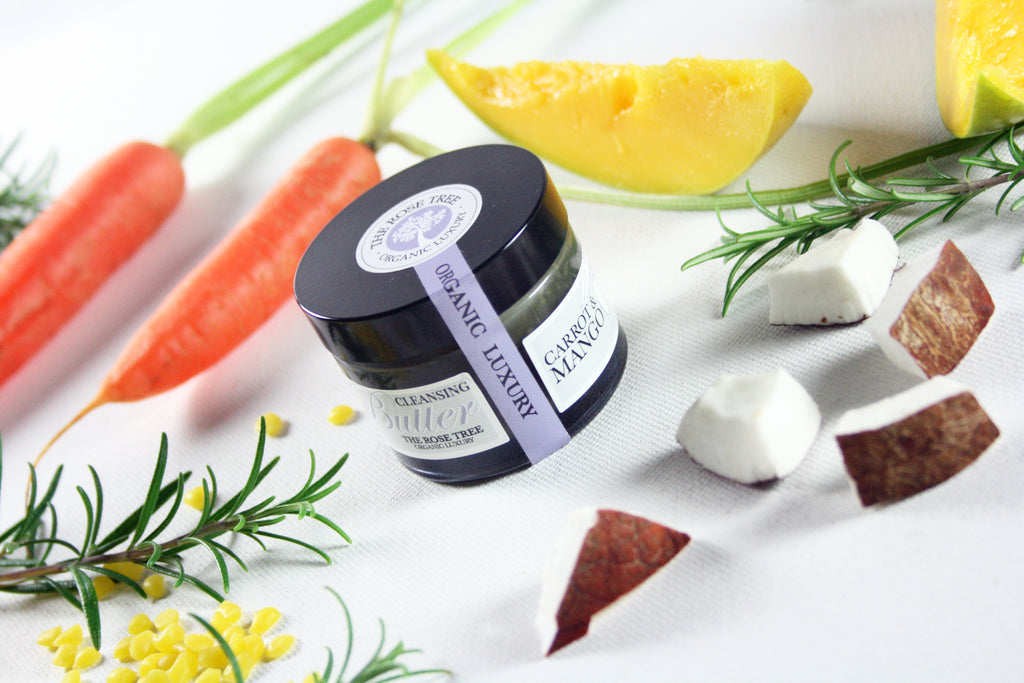What's Your Skin Type?

Don't we all dream of having well-behaved skin that never breaks out?

Well Behaved Skin That Never Breaks Out?
Imagine waking up without having to worry about what your skin looks like on any given day.
No redness. No lumps or bumps. And no dry or itchy patches.
Just your skin looking at its best.
That's the dream, right?
You may not believe it's possible, but the key to having great looking skin is to know your skin and use the right products; those that will nurture and ultimately improve its appearance and feel.
By recognising your skin type, and how to treat it allows you to have well-behaved skin that looks its best every single day.
And it makes it easy to care for your skin. No more bathroom cupboards full of stuff that just doesn't work for you.
So how do you test your skin? And how can you create an essential skincare routine to match?
Your Skin Type - a Quick Skin Type Test
You can do a simple skin type test in the comfort of your own home to find out exactly what type of skin you have.
Here's what I recommend you do:
- First thing in the morning, cleanse your skin and gently pat dry.
- Try my Carrot & Mango Cleansing Butter, which is suitable for all skin types.
- Leave your skin to settle for at least a couple of hours without applying any products - no lotions, no makeup, no moisturiser, etc.
- Observe the T-zone (forehead, chin, and nose), thoroughly check your skin looking out for the signs and symptoms below, and choose the type that best describes your skin as you see it.
Here are the most common skin types and their matching descriptions.
Normal Skin
Normal skin is well-balanced skin. (Lucky you!) You might get a little bit oily around the T-zone, which gives you a healthy shine on those areas. But overall, it doesn't look or feel too oily or too dry.
For you, the sebum (the natural-occurring oils that keep the skin moisturised) and the moisture that remains locked in your skin layers are well balanced.
When carrying out your skin type test, you're looking for:
- No redness or irritation and a fresh, flushed colour instead.
- Good blood circulation.
- No visible or fine pores or blackheads.
- An even tone.
- No blemishes or pimples.
- No acne.
- Soft and smooth texture to the touch.
Normal skin is radiant and can feel like a dream come true. It's not too oily. It's not too dry.
If you have normal skin, you're lucky; it can tolerate most skincare products and makeup without feeling irritated.
A simple everyday routine with beautiful plant ingredients will help keep your skin feeling healthy and comfortable. Look out for pure, natural ingredients with in built nurturing and comforting properties.
This is my super simple starter guide. A simple, organic skincare routine.
Dry Skin
Dry skin produces less sebum than normal skin. In other words, it lacks the oils (or lipids) that it needs in order to retain moisture and build a strong protective layer against external influences (like the weather or the products we use). Dry skin effectively has an impaired barrier function.
Of course, dry skin exists in varying degrees of severity and forms that aren't always easily distinguishable.
But when doing your skin test, on inspection, you'll know you have dry skin if you notice:
- Skin that feels tight, brittle, and rough to the touch.
- Sensitive skin with low elasticity.
- Dull-looking skin.
In more extreme cases, you might also be experiencing:
- Mild to extreme scaling or flakiness in patches.
- A rough and blotchy appearance.
- Itchiness.
- Chapping.
You'll be familiar with these symptoms as, especially in winter or when we wash our skin, they are also typical signs of dehydrated skin.
Dry versus Dehydrated Skin
There's an important difference between dry and dehydrated skin.
While dry skin is a skin type, dehydrated skin is a condition that anyone can experience. Dehydrated skin can be temporary (winter, anyone?) and is caused by a lack of water in the top layer of the skin.
So having dehydrated skin doesn't necessarily mean you have a dry skin type. People with other types of skin (normal or oily, for example) can also experience dehydration, especially on their hands, legs or face depending on the climate and temperature.
Exposure to the elements (sun, winds, rain, and cold), as well as hard water, hot showers and baths, air conditioning, and central heating can suck the moisture - and the life out of your skin.
Equally products that are too harsh or too light can also have a negative impact on dehydrated skin. So it's important to choose the right moisturiser.
My favourite products for dry skin?
For your face, pick my Facial Essence with Rose & Blackcurrant.
It's all about feeding your skin, nourishment, and satiny plumped up skin with generous amounts of Argan, Blackcurrant, Baobab, Camellia and Cranberry oils but no heavy or greasy feeling.
If you need another level of hydration, or if a face oil is just not you, I've got some options for you.
If you prefer a cream textured product try my Radiance Cream with Rose & Frankincense. It’s a gentle and rich moisturiser, particularly suited to thirsty, parched skin and is exceptionally good in a cold climate.
Or my Intensive Balm with Marshmallow & Frangipani is a decadently scented (with essential oils only!) balm which is perfect to nourish and moisturise skin that needs a little TLC.
It has a rich but light texture, and is concentrated, so only the smallest amount is needed.
It's particular good to skin any skin problems, those pesky dry bits, itchy bits or breakouts of eczema.
For parched hands, try one of my aromatherapy hand balms, it's packed with my favourite hydrators, including Coconut, Avocado, and Rosehip. See my hand care guide here.

A Note on Ageing Skin
The not-so-good news is that research proves that skin becomes drier as we age. And if we didn't already have enough going on as women, that's especially true for us.
As menopause approaches and oestrogen production diminishes, dry and itchy skin can become an annoying daily occurrence.
Age-induced dryness comes with feelings of tightness and the unwelcome appearance of fine lines and wrinkles.
If you've experiencing changes with your skin and find that it looks and feels drier, it might be time to change up your daily skincare routine. I've got a little guide on the best natural beauty tips for mature skin here.
Sensitive Skin
Sensitive skin tends to have a thinner barrier, sometimes also referred to as a 'leaky' barrier that doesn't trap moisture effectively. The phrase ‘sensitive skin’ is often used as an umbrella term to cover a range of conditions, including rosacea and eczema, for example.
But your skin can also become sensitive over time and due to external triggers. You can see more about sensitive skin triggers here.
If you suspect you might have sensitive skin, when doing your skin type test check out for:
- Skin that easily flushes or breaks out.
- Rashes and red bumps.
- Dry patches.
- Broken capillaries.
Your skin may also feel itchy and easily react to UV rays, fragrances (like the ones found in some beauty products), and bad weather.
You may also, at times, experience a stinging or burning sensation when using certain skincare products, including makeup and sunscreen.
Remember that if your skin reacts to a product, it's not the right thing to be using! Harsh chemicals don't marry well with sensitive skin, so opt for something gentler and more natural.
If you're looking at moisturisers for sensitive skin, these are 6 of my favourite moisturisers for sensitive skin.
Oily Skin
Oily skin is exactly what it says on the tin - it produces excess oil. It's effectively the opposite of dry skin and can give your face a shiny or greasy appearance, particularly around the T-zone.
So how do you know if you have oily skin?
Look out for:
- An excessively shiny look around your T-zone.
- Clogged or enlarged pores.
- Blackheads.
- Pimples.
- Acne.
Treating your oily skin with the right products is important to reduce the appearance of these signs.
The good news is that my oily skin ladies are less prone to the visible signs of ageing. Find out about oily skin and the best natural skin care for your skin type here.
Combination Skin
And finally, combination skin (one of the most common skin types) shows signs of different skin types all at once.
When carrying out your skin test, you might notice a mixture of oily and dry areas, with the T-zone being more oily than the rest of your face.
Here are the tell tale signs:
- Excessive oil and shine on the T-zone.
- Larger pores that can become blocked by the accumulation of dead skin cells.
- Blackheads and whiteheads.
- Dry, flaking skin on the cheeks and around your jawline.
- Acne breakouts.
- Occasionally, dandruff. While this isn't normally an indicator of skin type, many women with combination skin may also have dry, flaky patches on their scalp.
A combination skin type is best treated with products that give extra moisture to the dry areas of your face without adding oil to the already oily parts.
This is where choosing organic skincare and natural products that chemical-free and fragrance-free can give you the best results.
Matching Your skin Type With Your Skincare Routine
Once you've worked out what your skin type is, it's time to find the best skincare routine to match. Whether you have a sensitive, normal, dry, oily, or combination skin type, there's a product for you.
And if you're looking for a little extra help just reach out to us on social media, we'd love help.
So, which skin type are you?


